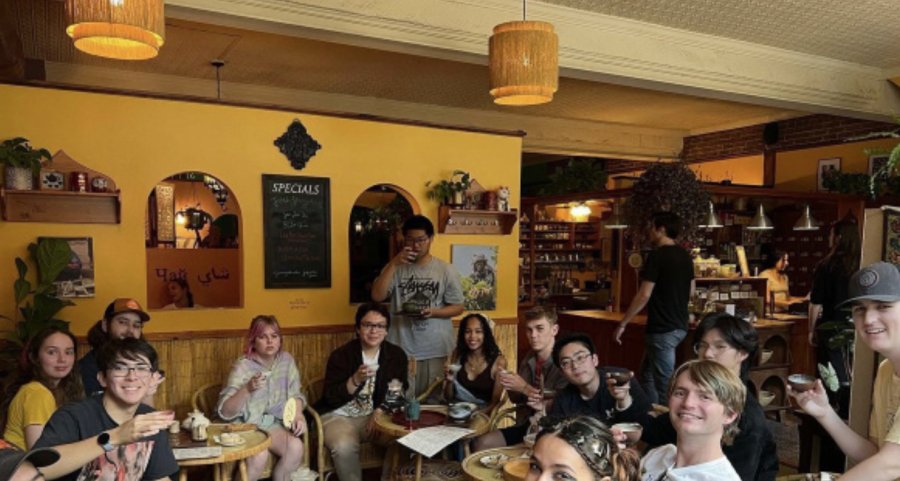Meet the World Tea Association
The club has become a common thread joining different campus groups
Courtesy of the World Tea Association
Members of the club sip tea at High Climate Tea, a teahouse in Asheville, on Nov. 6. They also visited Dobra Tea, a nearby teahouse in the same city.
November 17, 2022
21Sitting around a picnic table…Under a tent…On the floors of residence halls or tucked away in a lounge — a special community is brewing. This community is the Wake Forest World Tea Organization.
Senior William Liu founded the club after developing a passion for the many cultures behind tea during the pandemic. He identifies as a Chinese-Canadian individual and found himself wanting to learn more about this niche after his mother took him to several teahouses while in China.
“I was really inspired by the aesthetics of the environment, and the type of people…at these teahouses,” he says. “They would stay there for the entire afternoon and play games and chat.”
Inspired by the way these places brought people together and fostered community, Liu decided to bring this tradition to Wake Forest.
“It all started on the idea of bringing people together over tea,” he said.
This idea came into reality for many students. Celina Seo, a sophomore member, has found great pleasure in taking part in sessions. “It’s so great that Will’s vision became…a community,” Seo said.
Additionally, Liu wanted to spread the joys of tea to campus so that others may grow to love the thing that became a passion for him. Being a Chinese Canadian, Liu mentions how he felt he was always exploring cultural boundaries, and he was hopeful that bringing this organization to life would spread cultural awareness and education to students.
“The tea itself just [gives you] an amazing feeling,” he said. “[It’s] beyond what you get with coffee — more sustaining and more relaxing.”
Roxie Ray, a senior member of the group, has been with Liu through this whole tea journey.
“At first it was just me, Will and his roommate Crawford brewing tea in dorm rooms,” Ray said. “It’s since exploded into one of the largest clubs on campus with an extensive executive team”
The organization itself hosts multiple tea sessions a week on a sign-up basis — limiting sessions to a smaller quantity of participants. According to Liu, this lets members connect with each other on a more personal level.
The sessions can draw upon many different cultures. Some sessions in the past have included Persian teas, Japanese teas, Matcha ceremonies, Chai and Gongfu — a Chinese tea practice that means “brewing tea with time and effort.”
“A lot of freshmen tend to find a lot of their friend group through coming to sessions,” Liu said. “That was not part of the plan, but it was very nice to see.”
“I’ve seen many friendships formed in our club, and it connects so many people across different campus groups,” Ray said.
Junior Ada Li also loves the sessions for the welcoming environment that they provide.
“[The members] are definitely a group of amazing people that are diverse and inclusive,” she said. “Just in general, a great group of people that I would love to spend time and chat with.”
In addition to the sessions, the Tea Club offers its members different field trip opportunities each semester. In the fall, the group travels to Asheville to explore what Liu calls “the nuances of tea.” They visit many local teashops that focus on artisanal teas and learn more about the processes and cultural significance of tea-making.
In the Spring, the group takes an annual trip to Camellia Forest Nursery in Chapel Hill. Here, they get to have a hands-on learning opportunity and see how the tea is grown and processed.
The Tea Club frequently partners with other organizations on campus by hosting events together and catering tea and snacks. Recently, they partnered with the Office of Sustainability to host “Yoga and Tea.”
The organization has collaborated with the Asian Student Interest Association, the Chinese Culture Club and other organizations here on campus. Liu says the purpose of these partnerships is to “use tea as a way to relate or accommodate the topic that they are into.”
The group has also partnered with the anthropology department, which is one of Liu’s home departments. Here, they give talks to anthropology students about how tea relates to other cultures.
Though he is graduating next Spring, Liu hopes to see the tea club continue to grow in his absence. He has spent much of this year focusing on establishing a solid organizational structure for the club to operate on.
“In order for an organization to truly thrive, the organization itself and the members who belong to it have to all be aligned,” Liu said.
As far as himself, he plans on staying involved in this community even after graduation.
“I know that there’s a lot of communities in the US that have their own organizations and groups centered around tea,” he says. “I think wherever I end up…I will definitely look to find a local tea group or tea shop [to join].”
The members of the tea club will miss Liu as he leaves the group, but the community he left behind is ready to continue finding joy in their hobby.
“I feel that we stumbled upon a very serious niche in the Wake Forest community,” Louie Ballard, Vice President of the World Tea Association, said. “I am excited to see how the next generation of executives will build on what we have created thus far.”
Students can visit @worldteawfu on Instagram to learn more about this organization, as well as contact the executive board for more information.















